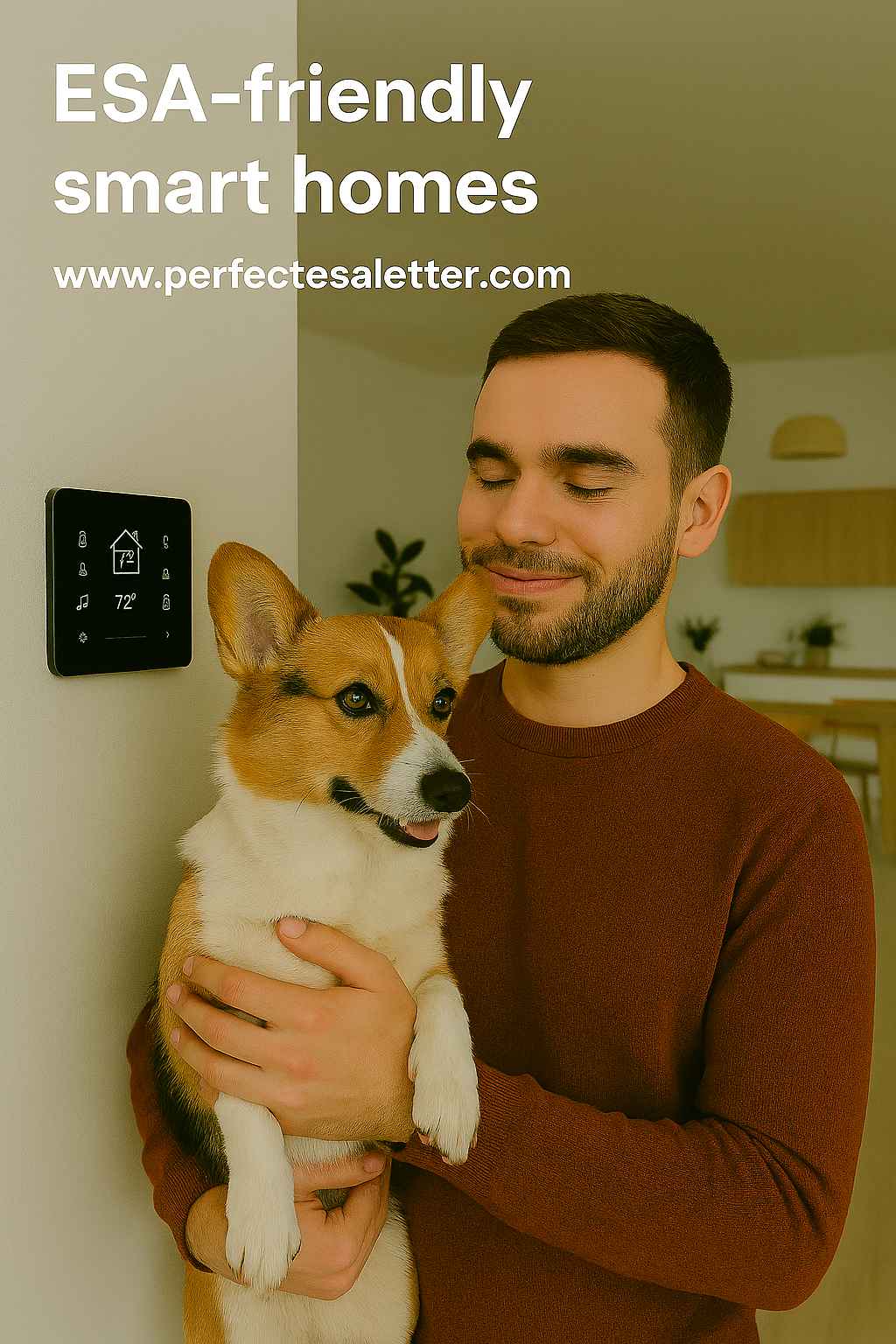ESA-Friendly Smart Homes: Modern Living with Emotional Support Animals
ESA-Friendly Smart Homes: Modern Living with Emotional Support Animals
Introduction
Technology is transforming the way we live. From voice-controlled lighting to app-managed security systems, smart homes are redefining comfort and convenience. For emotional support animal (ESA) owners, smart homes offer more than luxury—they provide security, safety, and convenience that can improve both the owner’s and the animal’s well-being.
This article explores why smart homes are ESA-friendly, the benefits they bring to tenants with ESAs, how legal protections apply, and practical tips for finding and maintaining ESA-approved smart rentals.
”Get Yours Now!
Don’t wait until a landlord or airline tells you “no pets allowed.” Protect your rights today.
Please fill out this form and our team wil contact you ASAP.
Complete your assessment in minutes , get approved by a licensed professional, and receive your letter within 24 hours.
What Are Smart Homes?
Smart homes are residential spaces equipped with internet-connected devices that allow homeowners or tenants to control and monitor systems like lighting, heating, appliances, and security remotely.
Examples of Smart Home Features:
- Voice assistants (Amazon Alexa, Google Home, Apple Siri).
- Smart thermostats (Nest, Ecobee).
- Automated lighting and blinds.
- Smart locks and doorbell cameras.
- App-controlled appliances.
- Pet-friendly smart feeders and monitoring cameras.
Why Smart Homes Are ESA-Friendly
- Better Pet Monitoring – ESA owners can check on pets while away using smart cameras.
- Improved Safety – Smart locks and alarms provide extra security for both the owner and ESA.
- Comfort Management – Smart thermostats maintain ideal temperatures for pets.
- Stress Reduction – Automated lighting and music help calm anxious ESAs.
- Convenience for Owners with Disabilities – Voice-activated devices make it easier for people with mobility issues to care for their ESA.
Legal Rights for ESA Owners in Smart Homes
Under the Fair Housing Act (FHA), ESA owners are protected regardless of whether the home is “smart” or traditional.
- No-Pet Policies: Landlords must allow ESAs, even in smart apartments or condos.
- No Extra Pet Fees: ESA owners cannot be charged pet rent, deposits, or fees.
- Reasonable Accommodation: ESA owners only need to provide a valid ESA letter from a licensed mental health professional.
- Technology Access: If smart features are part of the home, they must be equally available to ESA tenants without discrimination.
Benefits of ESA-Friendly Smart Homes
- Health Monitoring for Pets – Some devices track ESA health through smart collars.
- Interactive Features – Automatic feeders and treat dispensers keep pets engaged.
- Reduced Separation Anxiety – Owners can talk to pets through two-way smart cameras.
- Energy Efficiency – Smart thermostats save money while keeping pets comfortable.
- Accessibility for ESA Owners – Smart lighting and voice control help those with mental health conditions or physical limitations.
Challenges of ESA-Friendly Smart Homes
- Privacy Concerns – Smart cameras and devices collect data, which may concern tenants.
- Technology Malfunctions – Internet outages can affect automated pet care.
- Cost of Rentals – Smart homes are often more expensive than traditional rentals.
- Learning Curve – Not all ESA owners are comfortable with advanced technology.
- Landlord Restrictions – Some landlords may disable certain smart features for tenants.
Tips for ESA Owners Renting Smart Homes
- Verify ESA Rights First – Always present an ESA letter to secure legal protections.
- Check Pet-Specific Features – Look for homes with smart pet doors, feeders, or climate control.
- Ask About Internet Reliability – Stable Wi-Fi is essential for smart devices.
- Inquire About Maintenance – Ensure landlords provide tech support for smart devices.
- Set Up Zones for Pets – Use smart gates or smart plugs to control ESA-accessible areas.
Case Study: ESA-Friendly Smart Apartment in Seattle
Maria, an anxiety patient with a licensed ESA cat, moved into a smart apartment in Seattle. Her unit included a Nest thermostat, voice-controlled blinds, and a smart camera.
These features allowed her to monitor her cat while at work, maintain comfortable temperatures, and ease her anxiety by checking in through her phone. With an ESA letter, her landlord approved her request without additional fees despite the apartment’s “no-pet” clause.
✅ Lesson: Smart homes enhance not only convenience but also mental health and ESA care.
Alternatives to Smart Homes for ESA Owners
- ESA-Friendly Minimalist Apartments – Simple layouts with fewer distractions.
- ESA-Friendly Open Floor Plan Homes – Spacious environments for pets.
- ESA-Friendly Garden Apartments – Outdoor spaces for exercise.
- ESA-Friendly Luxury Lofts – High-end living with pet accommodations.
Future of ESA-Friendly Smart Homes
- AI-Powered ESA Care – Smart devices that detect stress in animals and respond with calming music or scents.
- Pet Health Tech – Integration of ESA health data into home systems.
- More Inclusive Rentals – Wider adoption of smart homes in affordable housing.
- Voice-Activated ESA Training Tools – Helping ESA owners reinforce commands remotely.
Conclusion
ESA-friendly smart homes are at the forefront of modern, inclusive living. They provide comfort, safety, and convenience for ESA owners while ensuring pets are cared for through innovative technology.
With legal protections under the Fair Housing Act, tenants can confidently seek smart homes without worrying about discrimination or unfair fees. For those who value both technology and emotional support, smart homes represent the perfect future of ESA-friendly housing.
”Get Yours Now!
Don’t wait until a landlord or airline tells you “no pets allowed.” Protect your rights today.
Please fill out this form and our team wil contact you ASAP.
Complete your assessment in minutes , get approved by a licensed professional, and receive your letter within 24 hours.

